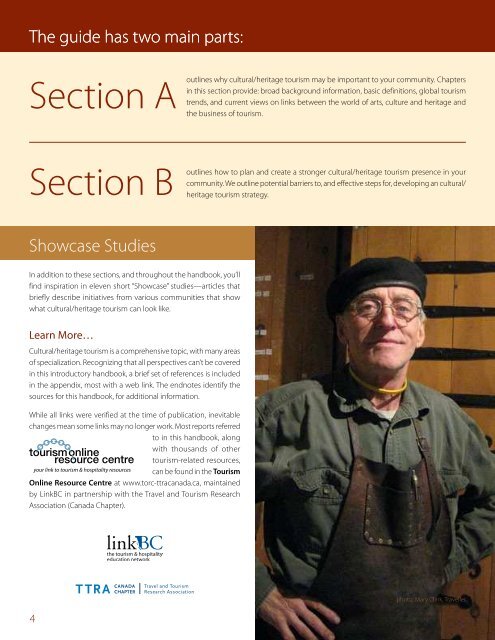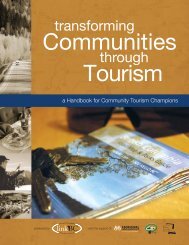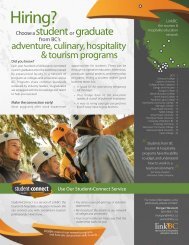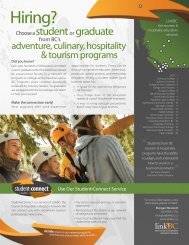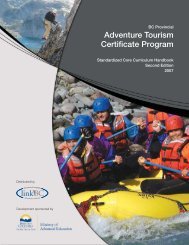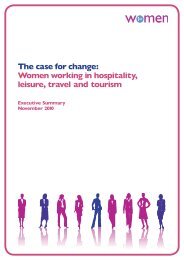Cultural Heritage Tourism Handbook - LinkBC
Cultural Heritage Tourism Handbook - LinkBC
Cultural Heritage Tourism Handbook - LinkBC
- No tags were found...
Create successful ePaper yourself
Turn your PDF publications into a flip-book with our unique Google optimized e-Paper software.
The guide has two main parts:Section ASectionShowcase StudiesIn addition to these sections, and throughout the handbook, you’llfind inspiration in eleven short “Showcase” studies—articles thatbriefly describe initiatives from various communities that showwhat cultural/heritage tourism can look like.Learn More…Boutlines<strong>Cultural</strong>/heritage tourism is a comprehensive topic, with many areasof specialization. Recognizing that all perspectives can’t be coveredin this introductory handbook, a brief set of references is includedin the appendix, most with a web link. The endnotes identify thesources for this handbook, for additional information.While all links were verified at the time of publication, inevitablechanges mean some links may no longer work. Most reports referredto in this handbook, alongwith thousands of othertourism-related resources,your link to tourism & hospitality resourcescan be found in the <strong>Tourism</strong>Online Resource Centre at www.torc-ttracanada.ca, maintainedby <strong>LinkBC</strong> in partnership with the Travel and <strong>Tourism</strong> ResearchAssociation (Canada Chapter).outlines why cultural/heritage tourism may be important to your community. Chaptersin this section provide: broad background information, basic definitions, global tourismtrends, and current views on links between the world of arts, culture and heritage andthe business of tourism.how to plan and create a stronger cultural/heritage tourism presence in yourcommunity. We outline potential barriers to, and effective steps for, developing an cultural/heritage tourism strategy.1. <strong>Cultural</strong>/<strong>Heritage</strong> <strong>Tourism</strong> & Your CommunityThis chapter briefly introduces the concept of cultural/heritage tourism and why it’sbecoming an important economic focus for many Canadian communities.1.1 Treasuring Our Past, Looking To the FutureIn some countries, such as Japan and France, individuals whodisplay exceptional mastery of an art or craft are officiallyrecognized as “Living Treasures.” These people keep traditionalarts and crafts alive, allowing heritage to be passed to followinggenerations. While Canada doesn’t have an official‘living treasures’ program, we do have people recognized fordevoting their lives to keeping our culture alive.One is Dr. Cyril Simard, a Quebec architect who foundedthe ECONOMUSEUM® network, which has grown into oneof the world’s most outstanding showcases of cultural/heritage tourism. In the welcoming comments below, Dr.Simard offers a word of encouragement and inspirationto community champions considering the possibilities incultural/heritage tourism.<strong>Cultural</strong> <strong>Heritage</strong> <strong>Tourism</strong>: the spirit of our places, our identityAs a global agent of communication, cultural tourism must positionitself as an agent of sustainable development, applying itself tothe core values of public education, respect for our differences,authenticity of our projects, and protection of our heritage.Sustainable development refers to economic growth. While it creates jobs and wealth, it cando so to the detriment of the values we cherish. While the exchange of goods is simple inmodern society, cultural tourism is a much more complex set of interactions. The experienceof the ECONOMUSEUM® network teaches us that visitors want an exchange with artisans atwork: they want to know how the products they consume can be traced, they want to findout about manufacturing processes, and they want moments of wonder in spaces wherethe spirit of the place is preserved and magnified.To develop humanized cultural tourism, our visitors must therefore take home emotions and souvenirs of a history, anexpertise, a new friendship. Hence the importance of preserving both our physical and our intangible heritage, as designatedby UNESCO, in accordance with universal ethics which call for expression of the beauty and the soul of our country.Through the richness of its contents and the quality of its authors’ message, there is no doubt that this guide will serveas an invaluable reference source at the service ofa humanized cultural tourism, an expression of ouridentity and our authenticity.Cyril Simard, O.Q., Ph.D.Chair, Board of DirectorsECONOMUSEUM®SOCIETY NETWORKSection A: Why <strong>Cultural</strong>/<strong>Heritage</strong> <strong>Tourism</strong> is Importantphoto: Mary Clark, TravellerA place for on-site exchange and learning, theECONOMUSEUM® is outfitted so that the artisan can personallyexplain and convey to visitors the secrets of their trade and theproducts which have been adapted to modern life.4 5


